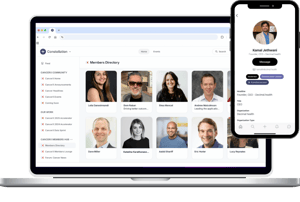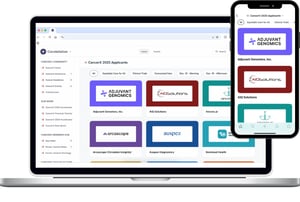
Beyond Access: Unburdening Oncologists Through High-Value Digital Solutions
The oncology care landscape faces a profound challenge. Among 328 oncologists responding to a 2023 questionnaire about professional well-being, the burnout rate was 59%—up from 45% in a similar survey conducted in 2013. Combined with mounting time pressure, information overload, and restricted access policies, oncologists increasingly find themselves spending more time on administrative tasks than patient care. This administrative burden doesn't just contribute to clinician burnout—it fundamentally limits the capacity for high-quality cancer care delivery.
Participants at the CancerX Executive Roundtable highlighted this growing crisis, with one oncology leader noting that "administrative burden" now ranks among their top three operational challenges. Another participant observed that "oncologists face mounting time pressure and information overload," creating a situation where "the specialized nature of oncology makes keeping current with rapidly evolving evidence increasingly difficult."
Traditional medical affairs approaches often compound these challenges rather than alleviating them. As one oncologist candidly shared, "I don't have time for another educational program, but I desperately need tools that reduce my administrative burden and help me make better decisions more efficiently."
Our experience reveals that the most successful medical affairs initiatives focus not on engagement minutes but on unburdening clinicians through solutions that create tangible time savings and clinical value. This shift moves beyond traditional information delivery to providing digital tools that actively remove workflow friction.
Protocol standardization tools represent one high-impact area. We work with technology companies that bring AI-powered protocol compliance solutions to health systems that dramatically reduce the administrative burden on nursing staff. The solutions provide context-aware recommendations that ensure adherence to complex oncology protocols with limited manual verification needed. The time savings on protocol verification allow nurses to free up time for more valuable activities and sometimes even allows health systems to establish dedicated new clinics that become a new revenue center for the clinic.
For complex cases, virtual molecular tumor board platforms can transform hours of preparation into minutes. A comprehensive solution we implemented for one medical center enabled automated case summaries—pulling relevant history, pathology, imaging, and molecular testing results into a unified view. This reduced case preparation time while increasing the number of cases that could be reviewed, allowing community oncologists to access subspecialty expertise for more patients.
The most significant value comes when these solutions directly support revenue-generating activities, not just process efficiency. One integrated health system deployed a symptom management platform that enabled their nurse practitioners to remotely monitor twice as many patients, qualifying for remote patient monitoring reimbursement while significantly reducing emergency department visits. The medical director summarized: "This doesn't just save time—it creates a new revenue stream while delivering better care."
We recurringly receive questions from medical affairs teams at pharmaceutical companies about how to optimally engage with KOLs and other providers. In our opinion, this shift from engagement to unburdening requires rethinking value propositions and success metrics. Rather than measuring time spent with physicians or message recall, success lies in quantifiable clinical workflow improvements, time savings, and new capability enablement.
What if your medical affairs strategy focused on giving oncologists back the most precious resource—time? How would your approach change if measured by minutes saved rather than minutes engaged? What if you could initiate value-creating partnerships that enable a practice to see more patients with the same staff, or establish a new service line that was previously impossible due to administrative constraints?
For oncology teams stretched to their limits, generic "digital engagement" offers little value. What they need are solutions that directly address their most pressing workflow challenges and enable higher-quality care delivery. By focusing on unburdening rather than educating, medical affairs can transform from being perceived as a time burden to becoming essential partners in practice optimization.
The path forward requires medical affairs to deeply understand specific practice workflow challenges. Solutions must be precision-targeted to eliminate specific administrative burdens, streamline complex decision processes, and enable capabilities that would otherwise remain beyond reach. Only then can pharmaceutical companies build relationships based on genuine value creation rather than information delivery—creating practice-transforming partnerships that transcend traditional product promotion.
In a landscape where every minute counts, digital strategies must earn their place by giving time back to clinicians. Download our Precision Oncology white paper for insights on transforming provider engagement from education to unburdening.
SCHEDULE A MEETING WITH THE AUTHOR
Sarah Boone is a strategic advisor who bridges pharma innovation with US healthcare systems to accelerate digital health adoption and market success.
.png?width=125&height=125&name=logo_wt%20(3).png)






.png?width=300&name=CancerX%20Decimal%20Banner%20(2).png)